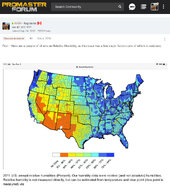RV8R
Solar Enthusiast
I thought that heating solves this. I know that whatever the wetness outside the van heater will always get rid of condensation so I guess the same must apply for whatever other heating as long as it is heating the space enough.
What have you guys done to cover your 'thermal bridges' where big blocks of insulation are no good like van frames and particularly the door frames. I guess I could be losing quite a lot through many exposed gaps here and there where I hadn't bothered completing the insulation. I know not the best but the priority moved to electronics and getting heating installed which was a big task.
I got a new pack of cork tiles now to cover the remaining exposed metal.
Hi @Gueyog8a7
I think I can help You. When in 2018 I first started researching what DIYers were doing to insulate their vans I was very surprised at how much bad information was out there.
I started this thread;

The Van Build Envelope - Design

I am a “Building Envelope Expert” on the “Wet Coast” in Canada. This is for buildings, not vans, but a lot of the Building Envelope Science transfers to vans
If You really want to understand HVAC & the process to dry out your van, read that long thread ( even join that Forum ), & learn.
In short You have to;
Stop any outside water leaks
dry out your van
insulate including what you can do to isolate air movement to the cold metal surface
Learn about “RH” & how to reduce it
It takes more energy to heat moist air than dry air. So in general, you heat up you moist air & then exhaust it outside, bring in fresh cold air, heat that air up & blow it outside, bring in cold outside air, repeat, repeat, repeat.
In order to help you, it would be good if you could post some photos. I would like to see your exhaust fans, your build, your heater, and other items that might create moisture like cooking facilities, shower, etc


